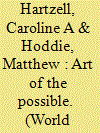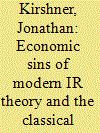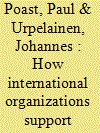|
|
|
Sort Order |
|
|
|
Items / Page
|
|
|
|
|
|
|
| Srl | Item |
| 1 |
ID:
138420


|
|
|
|
|
| Summary/Abstract |
Although there is now a wealth of scholarship concerning the onset, duration, and termination of civil wars, there is not nearly as much empirical research by political scientists on the potential for postconflict democratization in countries that have been the site of civil wars. This relative scholarly neglect of post–civil war democratization stands in contrast to the efforts and resources that other actors—foreign ministries, international and nongovernmental organizations, and members of civil society—have invested in attempting to help construct democracy in postconflict states such as Indonesia, Liberia, and Uganda.
|
|
|
|
|
|
|
|
|
|
|
|
|
|
|
|
| 2 |
ID:
138423


|
|
|
|
|
| Summary/Abstract |
ISMs matter. They reflect underlying philosophical points of departure and are rooted in specific explicit assumptions about how the world works. The very different expectations and conclusions of diverse theories often stem from the fact that those theories were derived from distinct and contrasting paradigmatic roots. To be aware of those foundations is to understand the likely strengths, weaknesses, limitations, controversies, and specific attributes of the various theories. In contemporary international relations (IR) scholarship there is a common claim that we are past paradigms, and many younger scholars are expected to recite this mantra. But making such a claim is a political act, not an intellectual one. It reflects the hegemony of one particular paradigmatic perspective—one with specific analytical building blocks of individualism, materialism, and hyperrationalism—an approach that is a paradigm and one so powerful that it has been described as an “intellectual monoculture.”
|
|
|
|
|
|
|
|
|
|
|
|
|
|
|
|
| 3 |
ID:
138421


|
|
|
|
|
| Summary/Abstract |
Democratization in the developing world is, according to Samuel Huntington, “an important—perhaps the most important—global political development of the late twentieth century.” While scholars of comparative politics have explored the domestic political economy of democratic transitions, they, along with scholars of international relations, also recognize that international actors, particularly international organizations (IOs), are crucial for successful political transformation.
|
|
|
|
|
|
|
|
|
|
|
|
|
|
|
|
| 4 |
ID:
138419


|
|
|
|
|
| Summary/Abstract |
A credible opposition is necessary for democratic accountability. However, in a multiparty democracy, a credible opposition may fail to emerge when it is in the strategic interest of political parties to collude rather than compete, effectively extinguishing all credible opposition. The author argues that illicit collusion among parties on a representative council is more likely when all viable parties win seats and are thus able to enter into a self-binding commitment to jointly engage in misconduct without risk of exposure. Conversely, when at least one party fails to win representation on the council, there is a credible opposition with the incentive and ability to threaten exposure of rent seeking among council members. The theory is tested using a regression discontinuity design where the electoral threshold to win a single seat is, within a narrow band, an exogenous determinant of whether or not there is an out-party or credible opposition. Exploiting the fact that Mali's decentralization produces within-country variation in both electoral and governance outcomes, the author uses data from commune council elections alongside local-level public goods provision as a measure of rent seeking. Poorer public goods provision is indeed more likely when all political parties in a district win seats on the council. To show that collusion is the mechanism driving this relationship, the author tests several observable implications in the data and uses qualitative evidence as illustration. This examination of when it is in the strategic interest of parties to engage in uncompetitive behavior contributes to the literature on when elections fail to produce democratic accountability.
|
|
|
|
|
|
|
|
|
|
|
|
|
|
|
|
| 5 |
ID:
138422


|
|
|
|
|
| Summary/Abstract |
What explains variation in immigration policy, especially policy regulating low-skill workers? A common argument invokes prejudice against foreigners as an explanation for why nations close their economies to immigrants. This prejudice has been ubiquitous throughout history even as immigration policies changed. Social theories of this sort may be descriptively true but are not helpful in predicting variation in policy. Other scholars have turned to the role that native labor plays in protecting its interests against immigration, but they have not explained why labor is able to restrict immigration when it has not been able to restrict trade, even though open trade has wreaked as much, if not more, havoc on labor. A third group of scholars focuses on states' concerns about the fiscal costs of immigrants as an explanation for the changes in policy over time. While fiscal costs are likely to play a role, this argument cannot explain exclusion prior to the creation of the modern welfare state in the early twentieth century. Finally, a fourth group of scholars has examined the power of immigrants themselves. While immigrants clearly affect immigration policy in democracies, they have never been a sufficiently large plurality of the polity to be able to change policy on their own, and they have less voice in autocracies where they can more easily be deported.
|
|
|
|
|
|
|
|
|
|
|
|
|
|
|
|
|
|
|
|
|